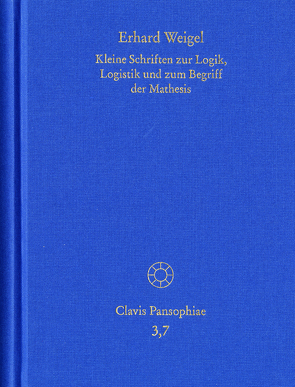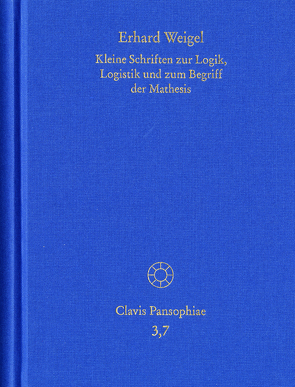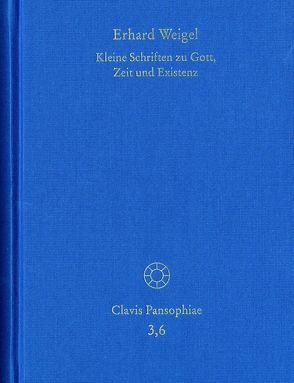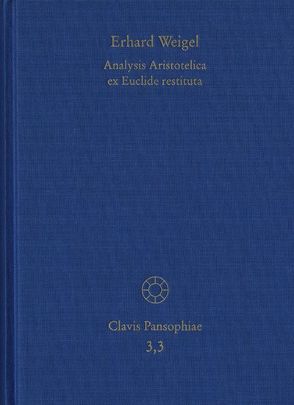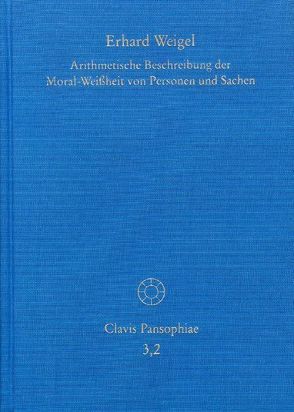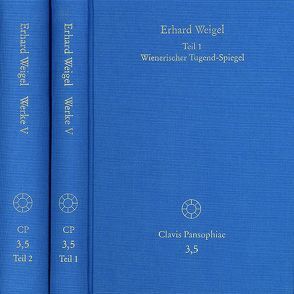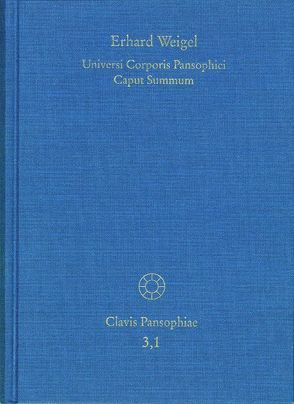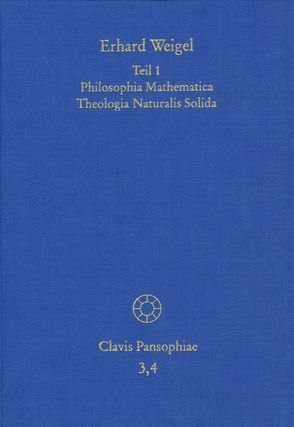Dieser Sammelband enthält mehrere Abhandlungen Weigels. Darin entwickelt er eine mathematikorientierte wissenschaftliche Methodologie, die in Arithmetik (Logistik) und Algebra Ansätze zu Regeln für den Erkenntniserwerb über beliebige Gegenstände sieht. Damit einher gehen Weigels Bestrebungen, die herkömmliche Syllogistik abzuwerten, andererseits aber auch mathematisch zu deuten. Zugleich ermöglicht sein veränderter Begriff der Quantitas, die er als exakte Bestimmung jedes beliebigen Prädikates begreift, die universelle Kompetenz der sie thematisierenden Disziplin (»Mathesis Universa«). Alle Abhandlungen gründen in einer dem Schularistotelismus entlehnten Habituslehre, die die verschiedenen Teilbereiche von Logik und Logistik in analoger Weise den »tres operationes mentis« zuordnet.
Aktualisiert: 2021-09-28
> findR *
Dieser Sammelband enthält mehrere Abhandlungen Weigels. Darin entwickelt er eine mathematikorientierte wissenschaftliche Methodologie, die in Arithmetik (Logistik) und Algebra Ansätze zu Regeln für den Erkenntniserwerb über beliebige Gegenstände sieht. Damit einher gehen Weigels Bestrebungen, die herkömmliche Syllogistik abzuwerten, andererseits aber auch mathematisch zu deuten. Zugleich ermöglicht sein veränderter Begriff der Quantitas, die er als exakte Bestimmung jedes beliebigen Prädikates begreift, die universelle Kompetenz der sie thematisierenden Disziplin (»Mathesis Universa«). Alle Abhandlungen gründen in einer dem Schularistotelismus entlehnten Habituslehre, die die verschiedenen Teilbereiche von Logik und Logistik in analoger Weise den »tres operationes mentis« zuordnet.
Aktualisiert: 2021-10-12
> findR *
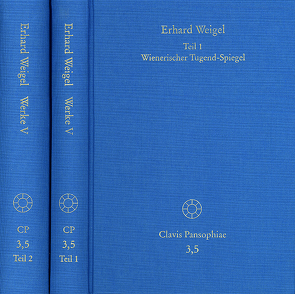
Der 1687 erschienene ›Wienerische Tugend-Spiegel‹ entwickelt vor dem geschichtlichen Hintergrund der Türkenkriege und im Gewand einer Beschreibung der Wiener Festungsanlagen eine pädagogisch ausgerichtete Tugendlehre. Die ebenfalls eingeschlossene ›Aretologistica‹ enthält in ihrem ersten Teil einen als »allgemeine Theorie der zehl- und meßbaren Dinge« titulierten Gesamtabriss der mathematikorientierten Philosophie Weigels unter Einschluss einer Ethik, die auch das moralische Handeln sowie die Tugend als Resultat eines Rechnens auffasst. Im zweiten Teil folgt eine Didaktik, die im Mathematikunterricht den Schlüssel zur allgemeinen Tugend- und Willensbildung sieht. Dies wurde auch praktisch erprobt in einem weitbeachteten Schulversuch, den ein beigefügtes zeitgenössisches Gutachten schildert.
The ›Wienerische Tugend-Spiegel‹ of 1687 develops a pedagogically oriented doctrine of virtue against the backdrop of the Turkish wars that is clothed in a description of the fortifications of Vienna. It also includes an ›Aretologistica‹ that contains in its first part an epitome of Weigels mathematical philosophy titled as »general theory of countable and measurable things« and an ethics that conceives moral action and virtue as a result of computation. The didactic in the second part sees in mathematical teaching the key to a cultivation of the will and education to virtue. It was put into practise by a famous school-experiment which is stated in a contemporary report included in the work.
Aktualisiert: 2023-03-14
> findR *
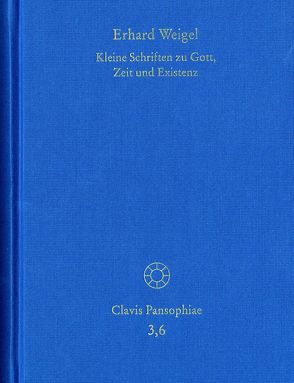
Dieser Sammelband enthält mehrere kleine Abhandlungen Weigels: Die beiden ›Dissertationes metaphysicae‹ von 1652 entwickeln in Abwehr essentialistischer Positionen einen Begriff der Existenz, der diese als Affektion jedes wahren Seins versteht und durch die beiden Modi der Dauer und räumlichen Lokalität bestimmt sein lässt. Die letztendliche Identifikation von Existenz und Dauer macht Weigel erstmals in seinen Schriften zur pansophischen Physik und zur Körperphilosophie zur Grundlage eines »mathematischen Gottesbeweises«, der aus der Erfahrung des beständigen zeitlichen Flusses der Dinge dieser Welt auf ein dem Wandel der Existenzweisen entzogenes gleichbleibendes Sein schließt, das die Welt in jedem Augenblick von neuem aus dem Nichts schafft und erhält (creatio continuata). Dieser Gottesbeweis hat bekanntlich Leibnizens Interesse erregt, dessen philosophischer Briefwechsel aus den siebziger Jahren auf einige der hier edierten Abhandlungen wie z. B. die ›Theodixis Pythagorica‹ von 1675 Bezug nimmt.
This anthology contains several small treatises of Weigel. In two metaphysical dissertations of 1652 he develops a non-essentialist concept of existence which is understood as affection of any true being and which is determined by the modes of duration and of space. Weigel finally identifies duration and existence; and in his treatises on pansophic physics and philosophy of body he bases a »mathematic proof« of divine existence on it. Weigel’s proof of divine existence derives from the experience of permanent temporal flux and deduces the existence of a permanent being exempt from that change which recreates the world from nothing and keeps it up in any instance (creatio continuata). It is well known that this proof aroused the interest of Leibniz whose philosophic correspondence of the seventies refers to some of the small treatises edited here like the ›Theodixis Pythagorica‹ of 1675.
Aktualisiert: 2020-12-01
> findR *
This anthology contains several small treatises of Weigel. In two metaphysical dissertations of 1652 he develops a non-essentialist concept of existence which is understood as affection of any true being and which is determined by the modes of duration and of space. Weigel finally identifies duration and existence; and in his treatises on pansophic physics and philosophy of body he bases a »mathematic proof« of divine existence on it. Weigel’s proof of divine existence derives from the experience of permanent temporal flux and deduces the existence of a permanent being exempt from that change which recreates the world from nothing and keeps it up in any instance (creatio continuata). It is well known that this proof aroused the interest of Leibniz whose philosophic correspondence of the seventies refers to some of the small treatises edited here like the ›Theodixis Pythagorica‹ of 1675.
Aktualisiert: 2019-01-08
> findR *
This treatise contains Weigel’s first all-encompassing depiction of his autonomous science, which conceives the geometrical method with its strict logical coherence both as the true philosophy and the universally valid method of any science. The treatise, which has an anti-scholastic bent, seeks to restitute the pure teachings of Aristotle. It is divided into sections addressing the definition and the subject of proof, the principles of proof and the practice of the proof or method. The latter unfolds, as methodus universalis, in an all-encompassing system of world wisdom throughout all philosophical disciplines. This system culminates in God as the greatest good or the origin and goal of science. The treatise significantly influenced the young Leibniz and his efforts to establish an all-embracing »scientia generalis«.
Aktualisiert: 2019-01-08
> findR *
›Arithmetische Beschreibung der Moral-Weißheit von Personen und Sachen‹ (Arithmetic description of the moral wisdom concerning persons and things) is Erhard Weigel’s most important work of social philosophy. It contains a pansophic political and social model that conceives the state as a moral space analogous to the domain of numbers. Weigel’s attempt to prove that certain numerical schemes such as the Tetractys form a basic principle in all categories of being complements his ascription of universal competence to the mathematical method as the sole way of grasping the essence of things. Weigel’s contractualist idea of the state and his approach to legal and political science with its emphasis on autonomy remain embedded in a universal concept that stresses the analogy of all categories of being and culminates in the idea of participation in the divine sapientia.
Aktualisiert: 2023-03-14
> findR *
The ›Wienerische Tugend-Spiegel‹ of 1687 develops a pedagogically oriented doctrine of virtue against the backdrop of the Turkish wars that is clothed in a description of the fortifications of Vienna. It also includes an ›Aretologistica‹ that contains in its first part an epitome of Weigels mathematical philosophy titled as »general theory of countable and measurable things« and an ethics that conceives moral action and virtue as a result of computation. The didactic in the second part sees in mathematical teaching the key to a cultivation of the will and education to virtue. It was put into practise by a famous school-experiment which is stated in a contemporary report included in the work.
Aktualisiert: 2023-03-14
> findR *
Erhard Weigel’s 1673 work contains the outline of a pansophic system that subjects all categories of being to the universal standard of the mathematical method. Following the doctrine of tres operations mentis, Weigel begins by establishing a parallel between definitions and numbers. While noting the artificiality of ordering definitions in this way, Weigel insists thatestimative knowledge alone is able to grasp the essence of things. It is only the mathesis, that is, the discretionary part of every science, that completes the project of a pansophic encyclopedia. Leibniz extensively studied and excerpted this work, which served as an important foundation for his plan for a demonstrative encyclopedia.
Aktualisiert: 2023-03-14
> findR *
This treatise (published in 1693) develops the concept of a universal science based on mathematics. It is also conceived as a methodologically exact natural theology. The foundation of this method is provided by the outlines of a universally applicable research logic modeled on geometrical analysis. The treatise contains a mathematically modeled doctrine of creation deployed as a metaphysics of movement, according to which the creature is understood as a geometrical image of divine thought. Weigel confronts the advance of atheism in his society with a mathematical proof of God’s existence, to which Leibniz responded with an elaborate critical appreciation.
Aktualisiert: 2023-03-14
> findR *
MEHR ANZEIGEN
Bücher von Weigel, Erhard
Sie suchen ein Buch oder Publikation vonWeigel, Erhard ? Bei Buch findr finden Sie alle Bücher Weigel, Erhard.
Entdecken Sie neue Bücher oder Klassiker für Sie selbst oder zum Verschenken. Buch findr hat zahlreiche Bücher
von Weigel, Erhard im Sortiment. Nehmen Sie sich Zeit zum Stöbern und finden Sie das passende Buch oder die
Publiketion für Ihr Lesevergnügen oder Ihr Interessensgebiet. Stöbern Sie durch unser Angebot und finden Sie aus
unserer großen Auswahl das Buch, das Ihnen zusagt. Bei Buch findr finden Sie Romane, Ratgeber, wissenschaftliche und
populärwissenschaftliche Bücher uvm. Bestellen Sie Ihr Buch zu Ihrem Thema einfach online und lassen Sie es sich
bequem nach Hause schicken. Wir wünschen Ihnen schöne und entspannte Lesemomente mit Ihrem Buch
von Weigel, Erhard .
Weigel, Erhard - Große Auswahl an Publikationen bei Buch findr
Bei uns finden Sie Bücher aller beliebter Autoren, Neuerscheinungen, Bestseller genauso wie alte Schätze. Bücher
von Weigel, Erhard die Ihre Fantasie anregen und Bücher, die Sie weiterbilden und Ihnen wissenschaftliche Fakten
vermitteln. Ganz nach Ihrem Geschmack ist das passende Buch für Sie dabei. Finden Sie eine große Auswahl Bücher
verschiedenster Genres, Verlage, Schlagworte Genre bei Buchfindr:
Unser Repertoire umfasst Bücher von
- Weigeldt, Ina
- Weigele, Erika
- Weigele, Klaus K
- Weigele, Klaus Konrad
- Weigele, Klaus W.
- Weigele, Marcel
- Weigele, Martin
- Weigele, Otmar M
- Weigele, Simon
- Weigele, Stefan
Sie haben viele Möglichkeiten bei Buch findr die passenden Bücher für Ihr Lesevergnügen zu entdecken. Nutzen Sie
unsere Suchfunktionen, um zu stöbern und für Sie interessante Bücher in den unterschiedlichen Genres und Kategorien
zu finden. Neben Büchern von Weigel, Erhard und Büchern aus verschiedenen Kategorien finden Sie schnell und
einfach auch eine Auflistung thematisch passender Publikationen. Probieren Sie es aus, legen Sie jetzt los! Ihrem
Lesevergnügen steht nichts im Wege. Nutzen Sie die Vorteile Ihre Bücher online zu kaufen und bekommen Sie die
bestellten Bücher schnell und bequem zugestellt. Nehmen Sie sich die Zeit, online die Bücher Ihrer Wahl anzulesen,
Buchempfehlungen und Rezensionen zu studieren, Informationen zu Autoren zu lesen. Viel Spaß beim Lesen wünscht Ihnen
das Team von Buchfindr.
